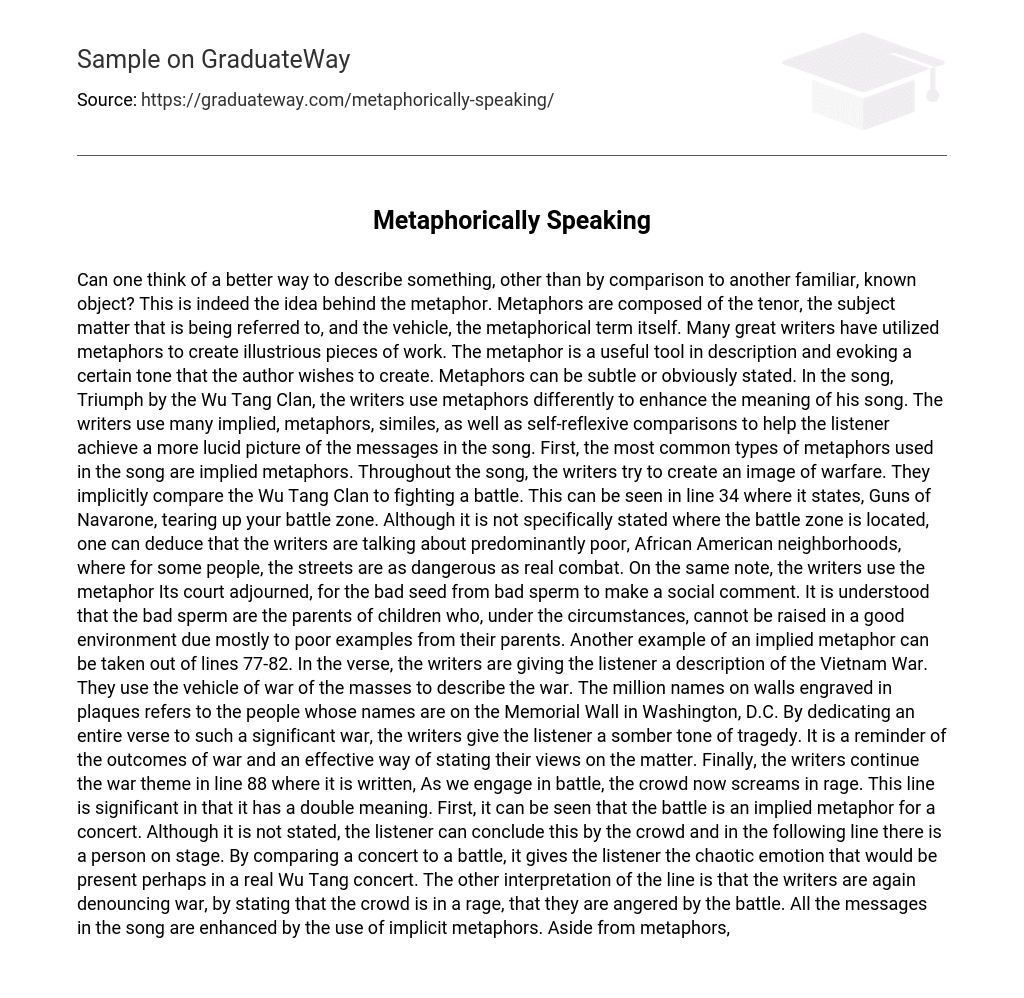The metaphor is a powerful tool used by writers to create vivid and impactful works. It involves comparing something to a familiar object and is composed of the tenor (the subject) and the vehicle (the metaphorical term). Metaphors allow authors to craft descriptions that evoke specific tones, whether subtly implied or explicitly stated. They serve as a means of conveying ideas in a unique and engaging manner.
The writers of the Wu Tang Clan’s song “Triumph” utilize various metaphors, similes, and self-reflexive comparisons to enrich the song’s meaning, allowing the listener to better comprehend its messages.
Implied metaphors are the most frequent types of metaphors used in the song, aiming to convey a sense of warfare by indirectly comparing the Wu Tang Clan to engaging in battle. Line 34 mentions “Guns of Navarone, tearing up your battle zone,” implying that the authors are referring to impoverished African American neighborhoods where the streets can be as perilous as an actual war.
The writers use the metaphor “Its court adjourned” to comment on how parents passing down negative traits to their children has a detrimental effect. This suggests that these children are unable to experience a positive upbringing because of their parents’ negative influence. Another example of an implied metaphor can be found in lines 77-82.
In this verse, the Vietnam War is portrayed as a war of the masses. The mention of a million names engraved on plaques refers to those honored on the Washington, D.C. Memorial Wall. By dedicating an entire verse to this significant war, the writers create a solemn and sorrowful mood for the listener.
Not only does it serve as a reminder of the consequences of war, but it also provides an effective platform for them to express their opinions on the subject. Additionally, in line 88, there is a continuation of the war theme where it declares that “As we engage in battle, the crowd now screams in rage.” This particular line holds significant meaning as it possesses a dual interpretation. On one hand, it can be understood that the battle is metaphorical and represents a concert. Though not explicitly stated, the audience’s reaction and the presence of someone on stage leads the listener to infer this comparison. By likening a concert to a battle, it evokes intense and chaotic emotions similar to what one might experience at an actual Wu Tang concert.
The line has another interpretation: the writers condemn war once again, asserting that the battle has infuriated the crowd. The song effectively conveys its messages through implied metaphors. Additionally, similes are employed by the writer to further develop the song, which, like metaphors, compare two dissimilar entities using “like” or “as”. An example is found in line 10, where it states that graphic displays melt steel as if they were blacksmiths.
The comparison between the tenor and graphic displays of lyrical rapping abilities can be likened to the act of a blacksmith melting steel at high temperatures. Wu Tang suggests that their skill in rapping is so exceptional that it can be equated to the heat of melting steel. In the subsequent verse, it begins with a simile: “As the world turns, I spread like germs.” Unlike the previous metaphors, this particular simile is explicit in its construction.
The rapper likened himself to germs that multiply rapidly, implying that he is widely recognized and firmly establishing his presence in the music industry. Line 70-72 presents another powerful simile, comparing the song to a current that travels through your body.
The simile used to describe how the beat makes the listener feel in line 72 implies that the music is incredibly emotionally intense, almost orgasmic. These positive depictions of the music are clearly intended to convey a sense of musical dominance to the audience. Additionally, the writers cleverly compare the music to Grand Central Station by playing on the word “terminal” in line 74. Describing the music as terminal or deadly serves as a metaphor for highlighting the extraordinary superiority of their beats.
The pun arises when the word terminal is also used to mean a station, in this instance, the Grand Central Station in New York. Additionally, the songwriter employs self-reflexive analogies in the song to aid the listener in visualizing the lyrics. These self-reflexive metaphors involve the Wu Tang Clan as the main subject. One instance of this can be found in line 50 where they compare themselves to an Olympic torch. By relating themselves to such a widely recognized and meaningful symbol, they are suggesting their own significance, as well as the importance of their music.
The concept of burning sweetly in Wu Tang’s music conveys the notion that they possess both positive and negative qualities simultaneously. This juxtaposition reflects their desired image as both notorious and talented artists. Additionally, the metaphor extends to comparing Wu Tang to a soldier in two instances within the lyrics. This further emphasizes their war-like mindset.
The writers compare themselves to soldiers, emphasizing their strength, boldness, and ability to overcome challenges and defeat enemies. They also compare Wu-Tang’s influence on the world to how soldiers control the globe and shape global activities. Additionally, in line 119, Wu-Tang boastfully compares themselves to a tranquilizer, suggesting that their music has a calming effect on listeners. Overall, these self-reflexive metaphors are used by the writers to showcase their pride and arrogance.
Overall, the Wu Tang Clan members have used metaphors in various ways within the song Triumph to enhance the listener’s understanding of its meaning. The writers make use of metaphors, similes, and comparisons to objects as means to convey the song’s message. Ultimately, the metaphor proves to be an indispensable tool for both literary and musical creators.





